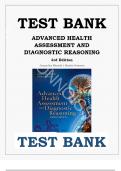R
U
SE
IS
O
N
N
O
C
ED
M
, R
U
SE
IS
O
N
N
O
C
ED
M
, Advanced Health Assessment and Diagnostic Reasoning
3rd edition Rhoads
TEST BANK
Chapter 1 Interview and History Taking Strategies
MULTIPLE CHOICE
M
1. The nurse is conducting an interview with a woman who has recently learned that she is
pregnant and who has come to the clinic today to begin prenatal care. The woman states that she
and her husband are excited about the pregnancy but have a few questions. She looks nervously
ED
at her hands during the interview and sighs loudly. Considering the concept of communication,
which statement does the nurse know to be most accurate? The woman is:
a. Excited about her pregnancy but nervous about the labor.
b. Exhibiting verbal and nonverbal behaviors that do not match.
c. Excited about her pregnancy, but her husband is not and this is upsetting to her.
d.
C
Not excited about her pregnancy but believes the nurse will negatively
respond to her if she states this.
O
ANS: B
Communication is all behaviors, conscious and unconscious, verbal and nonverbal. All behaviors
have meaning. Her behavior does not imply that she is nervous about labor, upset by her
N
husband, or worried about the nurses response.
2. Receiving is a part of the communication process. Which receiver is most likely to
misinterpret a message sent by a health care professional?
N
a. Well-adjusted adolescent who came in for a sports physical
b. Recovering alcoholic who came in for a basic physical examination
c. Man whose wife has just been diagnosed with lung cancer
O
d.
Man with a hearing impairment who uses sign language to communicate and who has an
interpreter with him
IS
ANS: C
The receiver attaches meaning determined by his or her experiences, culture, self-concept, and
current physical and emotional states. The man whose wife has just been diagnosed with lung
cancer may be experiencing emotions that affect his receiving.
SE
3. The nurse makes which adjustment in the physical environment to promote the success of an
interview?
a. Reduces noise by turning off televisions and radios
b. Reduces the distance between the interviewer and the patient to 2 feet or less
c. Provides a dim light that makes the room cozy and helps the patient relax
U
d. Arranges seating across a desk or table to allow the patient some personal space
ANS: A
The nurse should reduce noise by turning off the television, radio, and other unnecessary
R
equipment, because multiple stimuli are confusing. The interviewer and patient should be
approximately 4 to 5 feet apart; the room should be well-lit, enabling the interviewer and patient
to see each other clearly. Having a table or desk in between the two people creates the idea of a
barrier; equal-status seating, at eye level, is better.
, 4. In an interview, the nurse may find it necessary to take notes to aid his or her memory later.
Which statement is trueregarding note-taking?
a. Note-taking may impede the nurses observation of the patients nonverbal behaviors.
b.
Note-taking allows the patient to continue at his or her own pace as the nurse
M
records what is said.
c.
Note-taking allows the nurse to shift attention away from the patient, resulting
in an increased comfort level.
ED
d.
Note-taking allows the nurse to break eye contact with the patient, which may
increase his or her level of comfort.
ANS: A
The use of history forms and note-taking may be unavoidable. However, the nurse must be aware
C
that note-taking during the interview has disadvantages. It breaks eye contact too often and shifts
the attention away from the patient, which diminishes his or her sense of importance. Notetaking
may also interrupt the patients narrative flow, and it impedes the observation of the
O
patients nonverbal behavior.
5. The nurse asks, I would like to ask you some questions about your health and your usual daily
activities so that we can better plan your stay here. This question is found at the __________
N
phase of the interview process.
a. Summary
b. Closing
N
c. Body
d. Opening or introduction
ANS: D
O
When gathering a complete history, the nurse should give the reason for the interview during the
opening or introduction phase of the interview, not during or at the end of the interview.
6. A woman has just entered the emergency department after being battered by her husband. The
IS
nurse needs to get some information from her to begin treatment. What is the best choice for an
opening phase of the interview with this patient?
a. Hello, Nancy, my name is Mrs. C.
SE
b. Hello, Mrs. H., my name is Mrs. C. It sure is cold today!
c. Mrs. H., my name is Mrs. C. How are you?
d. Mrs. H., my name is Mrs. C. Ill need to ask you a few questions about what happened.
ANS: D
Address the person by using his or her surname. The nurse should introduce him or herself and
give the reason for the interview. Friendly small talk is not needed to build rapport.
U
7. During an interview, the nurse states, You mentioned having shortness of breath. Tell me
more about that. Which verbal skill is used with this statement?
R
a. Reflection
b. Facilitation
c. Direct question
d. Open-ended question
ANS: D




